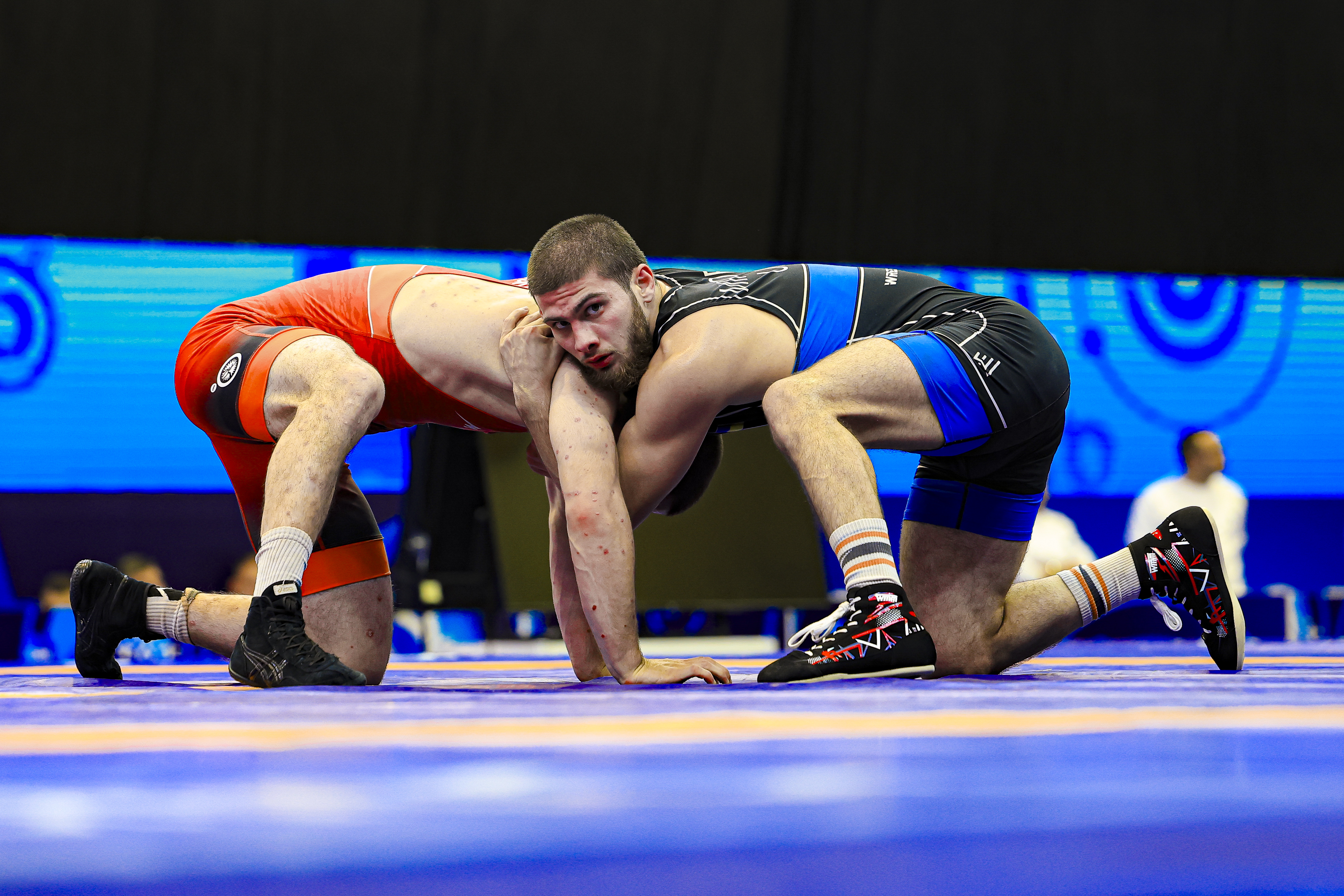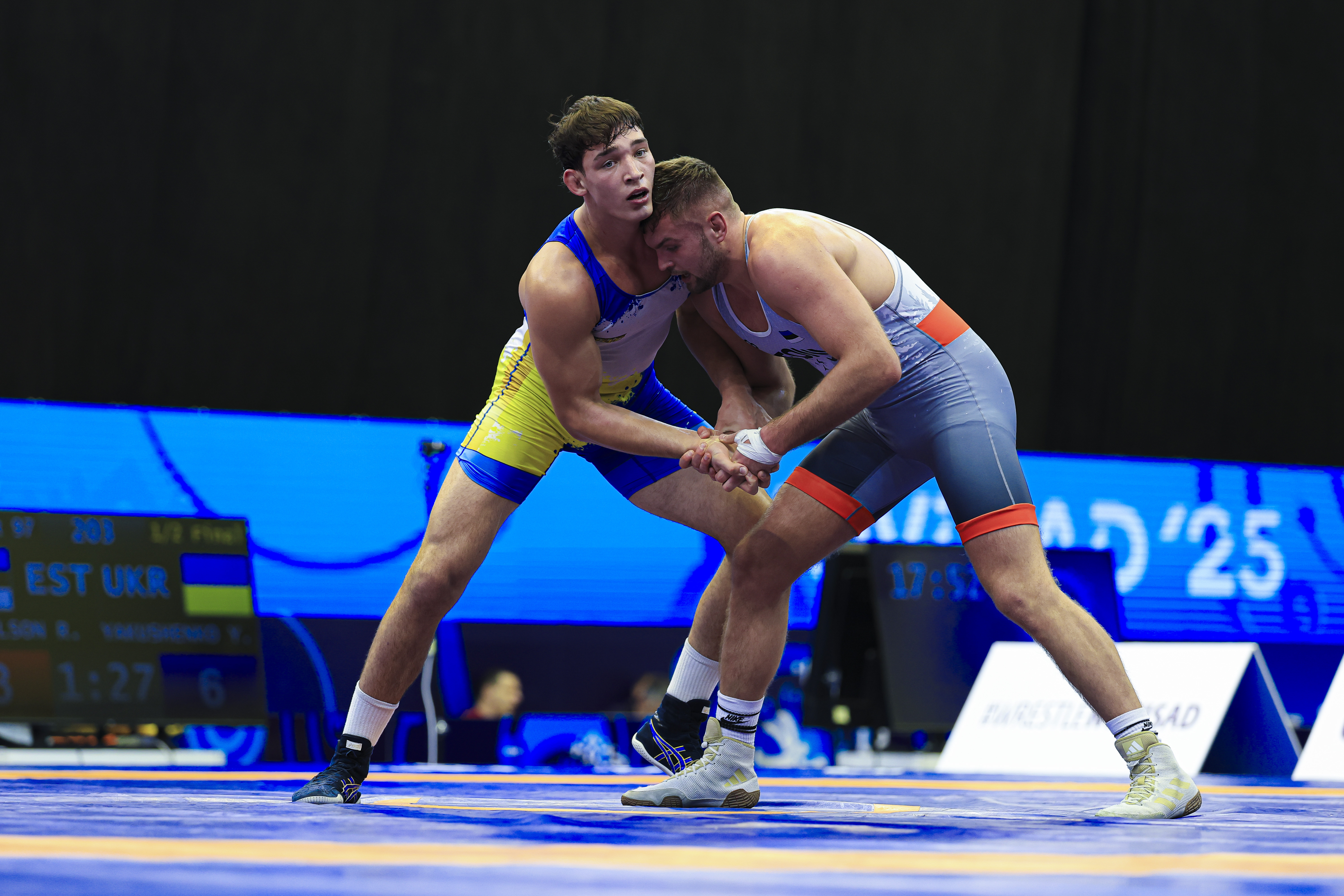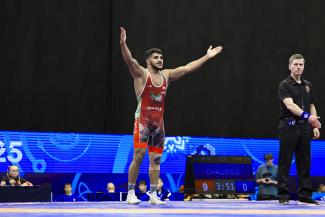NOVI SAD, Serbia (October 21) -- Iran’s Greco-Roman dominance shows no signs of slowing down. After winning team titles at the U17 World Championships in Athens, the U20 Worlds in Samokov, and the senior event in Zagreb, Iran looks poised to complete a clean sweep in Novi Sad as Gholamreza FAROKHI (IRI) and Fardin HEDAYATI (IRI) claimed gold medals at the U23 World Wrestling Championships 2025 on Tuesday.
World champion Farokhi and defending champion Hedayati, who celebrated his birthday as well on Tuesday, won gold medals in dominant fashion at 87kg and 130kg respectively.
"I was able to win two back-to-back tough matches at the World Championships and bring home two gold medals," Farokhi said. "These were high-level competitions."
Farokhi, a gold medalist at 82kg in Zagreb, moved up to 87kg for Novi Sad but had no troubles in switching weights. As he did in Zagreb, Farokhi brought his best game in par terre and rolled to his second gold in one month after a 9-0 victory in the final against Ivan CHMYR (UKR), his fifth technical superiority victory.
After being put on top in par terre, Farokhi launched a trap-arm gut and turned Chmyr four times for the win. Ukraine threw one of those ever increasing challenges for no reason but lost it to add one more point to Farokhi's score.
"When you move up a weight class, the opponents are definitely stronger and tougher," Farokhi said. "It was a good experience, and it gave me a better sense of how I can perform at 87 kg -- an Olympic weight class"
Hedayati, who has not lost an international bout since his 2022 U20 World Championships finals loss, showed why he will dominate the 130kg weight class for years to come.
Up against Razmik KURDYAN (ARM) in the final, Hedayati began with takedown on the edge for two points. Kurdyan was put in par terre and from there Hedayati turned him twice to extend his lead to 7-0. With just 23 seconds left before the break, Hedayati scored a stepout to finish the final 8-0 and claim his second straight U23 world title.
At 63kg, Ziya BABASHOV (AZE) upended returning 63kg U23 world champion Vitalie ERIOMENCO (MDA), 6-3, in the final using a four-point suplex from par terre to score his points.
Eriomenco, who had defeated Babashov in the U23 European finals, looked very dominant in run up to the final while Babashov had some tough bouts on Monday. But the Azerbaijan wrestler began aggressively and managed to earn first par terre advantage.
He performed a suplex for four points to make his lead 5-0 and take huge step towards winning his first ever world title. He further consolidated his position when he defended from par terre in the second period and gave up only stepout to Eriomenco as the score changed to 5-2.
Babashov then countered an attack from the Moldova wrestler and forced him to stepout outside to extend his lead to 6-2. He gave up one more stepout but held on to the 6-3 lead to win the gold medal.
With the win, he now leads the head-to-head against Eriomenco 2-1 as both have traded victories at 2024 U23 European Championships and its 2025 edition with the Moldovan one being the more recent winner.
 Irfan MIRZOIEV (UKR) holds off Temuri ORJONIKIDZE (GEO) in the 77kg final. (Photo: United World Wrestling / Amirreza Aliasgari)
Irfan MIRZOIEV (UKR) holds off Temuri ORJONIKIDZE (GEO) in the 77kg final. (Photo: United World Wrestling / Amirreza Aliasgari)
A silver medalist from 2023 at the U23 Worlds, Irfan MIRZOIEV (UKR) managed to win gold at 77kg as he defeated Temuri ORJONIKIDZE (GEO), 4-1, in the final.
Orjonikidze was himself to blame for the loss as he committed a defensive leg foul in the first period when Mirzoiev got the par terre position and as he was trying to lift, Orjonikidze blocked him with his leg, giving a 3-0 lead to the Ukrainian.
Georgia challenged the decision but on review, it was confirmed that a leg foul was indeed committed. The lost challenge gave one more point to Mirzoiev.
Orjonikidze got the par terre position in the second period but he failed to score any points and Mirzoiev easily defended his 4-1 lead to eventually claimed the gold medal.
 Yehor YAKUSHENKO (UKR) defeated Richard KARELSON (EST) in the 97kg semifinal. (Photo: United World Wrestling / Kadir Caliskan)
Yehor YAKUSHENKO (UKR) defeated Richard KARELSON (EST) in the 97kg semifinal. (Photo: United World Wrestling / Kadir Caliskan)
Yakushenko closer to U23 title
U20 world champion Yehor YAKUSHENKO (UKR) is a win away from winning his second world tittle three months after he reached the 97kg final at U23 World Championships. He defeated European Championships silver medalist Richard KARELSON (EST) 6-3 in the semifinals.
Karelson tried to make a match of it but Yakushenko scored a four-pointer from par terre to lead 5-0 before Karelson scored a takedown. But Yakushenko got a stepout to lead 6-2. He defended his lead despite Karelson getting par terre in the second period.
He will face Asian U23 champion Iussuf MATSIYEV (KAZ) who rolled to a 9-1 win over Maksim AVERIN (UWW), scoring four turns from par terre in the second period.
At 55kg, U23 European champion Alibek AMIROV (UWW) will face Elmir ALIYEV (AZE) in the final after he defeated Yerassyl MAMYRBEKOV (KAZ) in the semifinal. Amirov was down 2-1 when he got the
Aliyev hit a beautiful headlock for four against 2024 U17 world champion Armin SHAMSIPOUR (IRI) before securing the fall in the semifinal.
Anri KHOZREVANIDZE (GEO) will take on Hassan ABDELREHIM (EGY) for the gold medal at 67kg after he defeated Hleb MAKARANKA (UWW), 1-1, having the criteria from the first point score in a 1-1 finish.
Andelrehim led 4-1 when his opponent in the semifinal, Attila JOZSA (HUN), injury default for a leg injury.
Seven years after winning the U17 World Championships gold medal, Abror ATABAEV (UZB) will have a chance to win a second world title after he reached the 72kg final. After getting the first par terre and 1-1 lead against Merey MAULITKANOV (KAZ), Atabaev defended his par terre position and kept the 1-1 criteria lead.
Maulitkanov threw everything at Atabaev in the final two minutes but the Uzbekistan defended all the attacks. Atabaev was close to giving up a takedown in the final 15 seconds but he managed to keep himself up and then score a pushout to lead 2-1. Kazakhstan challenged the call but it was a clear stepout and the lost challenge made it 3-1 for Atabaev.
He will face former Asian champion Iman MOHAMMADI (IRI) for gold after the Iranian defended his 1-1 criteria lead against Gaspar TERTERYAN (ARM). The final will be battle of two Asian champion as Atabaev won that title in 2023.
RESULTS
63kg
GOLD: Ziya BABASHOV (AZE) df. Vitalie ERIOMENCO (MDA), 6-3
BRONZE: Dordzhi SHUNGURTSIKOV (UWW) df. Servet ANGI (TUR), 6-1
BRONZE: Adham ELSAYED (EGY) df. Kuttubek ABDURAZAKOV (KGZ), 3-2
77kg
GOLD: Irfan MIRZOIEV (UKR) df. Temuri ORJONIKIDZE (GEO), 4-1
BRONZE: Alexandru SOLOVEI (MDA) df. Doniyorkhon NAKIBOV (UZB), 3-3
BRONZE: Levente LEVAI (HUN) df. Jonni SARKKINEN (FIN), 4-2
87kg
GOLD: Gholamreza FAROKHI (IRI) df. Ivan CHMYR (UKR), 10-0
BRONZE: Payton JACOBSON (USA) df. Lachin VALIYEV (AZE), 5-3
BRONZE: Achiko BOLKVADZE (GEO) df. Yassine BEN LABED (POL), 5-1
130kg
GOLD: Fardin HEDAYATI (IRI) df. Razmik KURDYAN (ARM), 8-0
BRONZE: Laszlo DARABOS (HUN) df. Saba CHILASHVILI (GEO), via fall (4-0)
BRONZE: Aleksandr MELEKHOV (UWW) df. Artur SARKISJAN (CZE), 9-1
Semifinals
55kg
GOLD: Elmir ALIYEV (AZE) vs. Alibek AMIROV (UWW)
SF 1: Elmir ALIYEV (AZE) df. Armin SHAMSIPOUR (IRI), via fall (5-1)
SF 2: Alibek AMIROV (UWW) df. Yerassyl MAMYRBEKOV (KAZ), via fall (7-2)
67kg
GOLD: Anri KHOZREVANIDZE (GEO) vs. Hassan ABDELREHIM (EGY)
SF 1: Anri KHOZREVANIDZE (GEO) df. Hleb MAKARANKA (UWW), 1-1
SF 2: Hassan ABDELREHIM (EGY) df. Attila JOZSA (HUN), via inj. def. (4-1)
72kg
GOLD: Iman MOHAMMADI (IRI) vs. Abror ATABAEV (UZB)
SF 1: Iman MOHAMMADI (IRI) df. Gaspar TERTERYAN (ARM), 1-1
SF 2: Abror ATABAEV (UZB) df. Merey MAULITKANOV (KAZ), 3-1
97kg
GOLD: Yehor YAKUSHENKO (UKR) vs. Iussuf MATSIYEV (KAZ)
SF 1: Yehor YAKUSHENKO (UKR) df. Richard KARELSON (EST), 6-3
SF 2: Iussuf MATSIYEV (KAZ) df. Maksim AVERIN (UWW), 9-1



 Irfan MIRZOIEV (UKR) holds off Temuri ORJONIKIDZE (GEO) in the 77kg final. (Photo: United World Wrestling / Amirreza Aliasgari)
Irfan MIRZOIEV (UKR) holds off Temuri ORJONIKIDZE (GEO) in the 77kg final. (Photo: United World Wrestling / Amirreza Aliasgari) Yehor YAKUSHENKO (UKR) defeated Richard KARELSON (EST) in the 97kg semifinal. (Photo: United World Wrestling / Kadir Caliskan)
Yehor YAKUSHENKO (UKR) defeated Richard KARELSON (EST) in the 97kg semifinal. (Photo: United World Wrestling / Kadir Caliskan)
Share your thoughts.
Comments